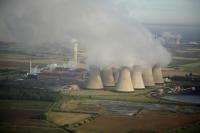Three of Chicago’s largest sources of air pollution will shut down or become dramatically cleaner with the decision by a major utility to cut smog, soot and mercury pollution from its six coal-fired power plants.
Various media outlets are saying the decision, by Midwest Generation, followed months of negotiation with city officials. The company said three aging plants in Waukegan and Chicago’s Pilsen and Little Village areas might close if they decide it isn’t worth spending millions to clean them up. In exchange, Midwest was given more time to meet standards.
Mercury emissions will be controlled by 2009, nitrogen Oxide by 2012 and sulfur dioxide by 2018. The cuts will be faster and deeper than U.S. rules require, according to the Chicago Tribune.
Cleaning up Midwest‘s dirty smokestacks is critical for the Chicago area. Sulfur dioxide and nitrogen oxide churning from the coal plants contribute to smog and soot that hangs over the city and its suburbs, especially during the summer.
The company also is the state’s largest source of mercury, which falls into lakes and streams and becomes more dangerous as it moves up the food chain. It was responsible for 1,533 of the 5,609 pounds of mercury released into the air in Illinois during 2004, the last year for which figures are available.
Subscribe to our newsletter
Stay up to date with DeSmog news and alerts







